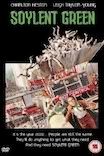1970s SF film

Soylent Green, 1973, USA DIRECTED BY RICHARD FLEISCHER
I saw this on video sometime in the late 1980s, and didn't really pay too much attention to it as I already knew the direction it took (and I've also never been much of a Charlton Heston fan). Now having recently read the novel I wanted to watch it again and perhaps view it in a fairer light, and I can see it's very much a film that's "based on" Harry Harrison's Make Room! Make Room! as opposed to being a direct retake of the book. Set in New York in 2022 instead of 1999, all the basic elements of the novel are still there but Stanley Greenberg's screenplay takes it all a step sideways, giving it its understated horror theme that actually doesn't conflict with Harrison's initial concept. As with the novel, the heart and soul of the movie still resides in Edward G. Robinson's character Sol; this was to be Robinson's 101st and final film before dying of cancer weeks later, and he was by this time almost completely deaf yet carried on to give a completely magnetic performance, and his role as Sol, one of the elderly "books" that aid police research with their knowledge of earlier times, seems to directly reference the memorable conclusion of Fahrenheit 451. The film certainly reflected the concerned mood of the time - 1972, when it was filmed, saw the world's first global environmental conference in Stockholm, and overpopulation was at last being recognised as an environmental issue. I'm still no fan of Charlton Heston, but his portrayal of the cop Thorn is certainly not the completely macho performance that I half-remembered it being and I can see a more relaxed Heston here, one with an almost visible desire to bring out the best in the other actors, and this more laid-back demeanour is something that certainly contributes to the movie's success. Conversely, the overall role of women depicted in this society has taken an retrograde step in comparison to the subtle feminist subtext of Harrison's novel, here being shown as little more than property and furniture to a man's world: most of the colours throughout the film are functional khakis, greys and browns, and it often seems that only the colourful personalities and clothes of the women can brighten this grim, dystopian, man-made future. I'm pleased I can regard this film in a more favourable light than I once did, although I still hope that if the projected remake ever goes beyond development (currently reckoned for a 2012 release) the screenplay will avoid the macho aspect, which to my mind still seems redundant and unnecessary.